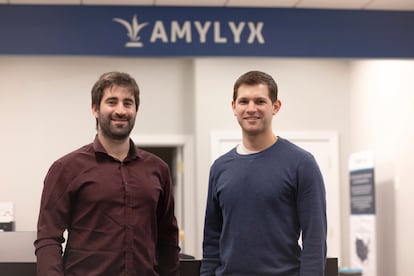The US approves ALS drug despite doubts about its effectiveness
The FDA greenlighted the medication ahead of a larger trial after doctors and patients advocated its use in the absence of alternatives


The United States Food and Drug Administration (FDA) has approved a drug for the treatment of patients with amyotrophic lateral sclerosis (ALS), an incurable neurodegenerative disease. Given the current lack of alternatives, the pharmaceutical regulator has greenlighted the medication, which will be marketed as Relyvrio, despite doubts about its effectiveness and without waiting for the outcome of a larger clinical trial to be completed in 2024. Trials with Relyvrio have been funded in part with money raised from the Ice Bucket Challenge, which went viral on social media in 2014.
The FDA said in a memorandum that “there are no significant safety signals of concern” regarding AMX0035, the scientific name for the drug, which contains sodium phenylbutyrate and taurursodiol. A 24-week study of 137 adult ALS patients, some of whom received a placebo, showed that patients treated with Relyvrio experienced a slower rate of decline in a clinical assessment of their functionality compared to those who received the placebo. Additionally, longer overall survival was observed in a long-term analysis of patients who initially received the compound versus those who received the placebo.
The FDA admitted that there is “a degree of residual uncertainty about the evidence of effectiveness that exceeds” what is normal for the approval of drugs. “However, given the serious and life-threatening nature of ALS and the substantial unmet need, this level of uncertainty is acceptable in this instance.”
Patient pressure
ALS is a rare disease that attacks and kills the motor neurons that control voluntary muscles, those that produce movements such as chewing, walking, breathing, and speaking. The disease causes nerves to lose the ability to activate specific muscles, causing the muscles to weaken and leading to paralysis. It is a progressive disease that gets worse over time. Death from respiratory failure occurs in most cases, usually within three to five years from the onset of the first symptoms.
In the absence of alternatives, doctors and patient associations have insistently advocated the approval of the drug, developed by Amylyx Pharmaceuticals, a laboratory based in Cambridge (Massachusetts). Amylyx promised to withdraw it from the market if it eventually proved to be ineffective. The company made a similar commitment to the Canadian regulator, which approved the drug in June. The FDA prioritized the review and also granted it orphan drug designation, which provides incentives to help and encourage the development of drugs for rare diseases.
Amylyx was founded in 2013 by Josh Cohen and Justin Klee and is valued at around $1.8 billion. When they were students at Brown University (Providence, Rhode Island), they thought of combining sodium phenylbutyrate, a drug indicated in urea cycle disorders, with taurursodiol to protect brain neurons in degenerative diseases such as ALS. Cohen and Klee have overseen the drug’s development “from its inception as a dorm room concept to its current status,” the company says on its website.
Amylyx has not yet announced a price for the drug in Canada or the United States, but it does state its goal of making it accessible to all who need it by providing financial assistance options. Amylyx shares soared on the stock market on Thursday in off-market operations. The company has called a conference with analysts and investors for Friday.
About 5,000 people are diagnosed with ALS each year in the United States, and about 20,000 Americans currently have the disease, according to the FDA. Amylyx raises that figure to 29,000.
Tu suscripción se está usando en otro dispositivo
¿Quieres añadir otro usuario a tu suscripción?
Si continúas leyendo en este dispositivo, no se podrá leer en el otro.
FlechaTu suscripción se está usando en otro dispositivo y solo puedes acceder a EL PAÍS desde un dispositivo a la vez.
Si quieres compartir tu cuenta, cambia tu suscripción a la modalidad Premium, así podrás añadir otro usuario. Cada uno accederá con su propia cuenta de email, lo que os permitirá personalizar vuestra experiencia en EL PAÍS.
¿Tienes una suscripción de empresa? Accede aquí para contratar más cuentas.
En el caso de no saber quién está usando tu cuenta, te recomendamos cambiar tu contraseña aquí.
Si decides continuar compartiendo tu cuenta, este mensaje se mostrará en tu dispositivo y en el de la otra persona que está usando tu cuenta de forma indefinida, afectando a tu experiencia de lectura. Puedes consultar aquí los términos y condiciones de la suscripción digital.








































